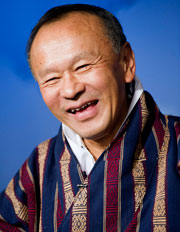Some time ago, I was ‘converted’ to the creed of well-being politics, if I may use that term. To the extent they’re willing to listen, I’ve told many people why I believe governments should adopt a broader perspective than economic growth and fully integrate environmental and social development in their policies.
In this context, I’ve had the question whether I’m pursuing a personal political agenda behind this. I’ve never had a clear-cut answer to this. Firstly, I don’t see myself as a politician. It’s a tough job to have a well-founded opinion about everything. And secondly, as a person with a social-liberal disposition, I am not sure how large the role of the government can be.
My recent discussions with fellow social-liberals indicated limited political support for my ideas to attach more weight to policies that can enhance well-being and happiness. And at the two congresses I recently attended, it still seemed to be seen as a creative, somewhat strange, idea. But what is the purpose of our state, if not promoting the well-being of its citizens?
Part of the aversion is out of fears of governments deciding how we should be happy. Even if that’s a concern in totalitarian states, there is no reason to dismiss any government role in ‘well-being politics’. Naturally, the government should in no way tell us how to be happy. Every individual is responsible for their own life and the happiness and well-being that result from their choices. Still, there are areas where we need our governments.
In the current post-crisis ‘happiness wave’, there is more attention for these policies. Media increasingly pay attention to it. On Bhutan’s initiative, the UN introduced an International Day of Happiness in 2013. Venezuela has a minister of supreme happiness. And several countries are exploring new ways to integrate well-being in their policies.
Beyond economic growth
The main point of the well-being political agenda is that objectives other than economic growth should be granted a larger role in political decisions. An important method to do this is the Gross National Happiness (GNH) index (see also this earlier post). If you are not familiar with its methodology, GNH by its name can come across as a vague phenomenon pursued by pot-smoking, tree-hugging utopians.
But it is a lot more solid than that. The Bhutanese concept is based on 124 variables that determine an individual’s well-being or quality of life. And apart from GNH, there are many other alternative ‘beyond GDP’ indicators.
Their aim is basic and revolutionary at the same time. Beyond GDP indicators (there is at least a dozen contenders) aim to benchmark the performance of a society in a broader perspective. Gross Domestic Product (GDP) has many advantages, but doesn’t reflect the costs (in economic and well-being terms) of environmental damage and social inequality.
The assumption of ‘beyond GDP’ advocates that if you measure something else – GNH instead of GDP – you’ll also act differently. A state that benchmarks its performance on GNH does not neglect the importance of monetary wealth. What it tries to do is to carefully balance the benefits of economic growth with its environmental, social and psychological impact. Politicians are increasingly aware of the promise of well-being politics. One party congress I attended adopted a position calling for the use of the Index of Sustainable Economic Welfare (ISEW). But there is still a long way to go before politicians truly implement these lessons. I will play my part in convincing them.

